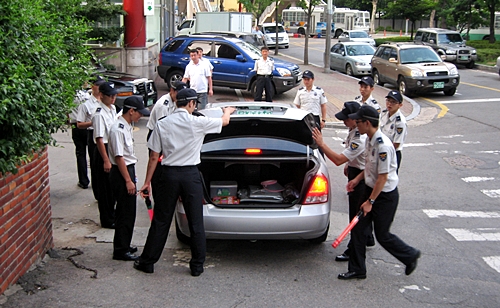I'm currently assisting a number of clients with "peace bond" problems. These are orders under s. 810 of the Criminal Code that can subject you to "keep the peace and be of good behaviour for any period that does not exceed twelve months, and comply with such other reasonable conditions prescribed in the recognizance" such as prohibiting you from being at or within a specific distance of a place, or prohibiting you from communicating directly or indirectly with a particular person.
A justice of the peace (or judge) can impose a peace bond on you when a person demonstrates that he or she has reasonable grounds to fear that you "will cause personal injury to him or her or to his or her spouse or common-law partner or child or will damage his or her property." A mini-trial is actually held by the court to determine if the peace bond should be imposed - that's why you really need legal counsel to defend you if you receive a notice that someone is seeking a peace bond against you.
Being subject to a peace bond is a lot like being on bail. Peace bonds make conduct illegal that was previously perfectly legal. Like sending an e-mail or text to someone. Or attending at that person's place of work or home.
Breach of the peace bond can lead to serious criminal consequences. There's some debate among Canadian criminal lawyers over exactly which punishment provisions apply to peace bond breach, as s. 810 of the Criminal Code doesn't itself stipulate any specific punishments, but up to 2 years imprisonment seems a definite possibility for peace bond breach pursuant to s. 127 of the Criminal Code, which is a catch-all punishment provision for disobeying a court order.
Refusing to enter into the peace bond recognizance, after it has been ordered by the court, can also get you up to 12 months in jail.
The fact you have been ordered to enter into a peace bond (even if you consented) also winds up on police databases, potentially for the rest of your life. No, it's not a "criminal record," but it does at times convey the impression that you were up to no good, and thus the peace bond was ordered to protect someone from you.
Pace bonds are serious business, so you need to know when you should and should not be thinking of voluntarily entering into them.
When voluntarily entering into a peace bond can be a good idea: if you are being prosecuted for criminal offences under the Criminal Code, and instead of the Crown proceeding with the prosecution you are offered the alternative of voluntarily entering into a peace bond, such an offer is usually a good deal that you should jump at.
Do get some legal advice before consenting in such a situation. Even if you are representing yourself on the charges to which the peace bond is an alternative, "duty counsel" at the court house may be able to give you some summary advice. Here the peace bond is way better than being convicted of a criminal offence after trial, and also way better than receiving an absolute or conditional discharge as a sentence.
When voluntarily entering into a peace bond can be a bad idea: if you aren't facing any kind of criminal charges, and instead have a peace bond application dropped on you by your neighbour/ co-worker/ family member. In these cases, there has been no government filter (like the police or prosecution service) involved in deciding whether a peace bond application should proceed. Instead, this is essentially a private prosecution which might have no basis in reality whatsoever, and where you can essentially be found guilty on a balance of probabilities standard, not on a proof beyond a reasonable doubt standard.
If you aren't facing other court proceedings that will be halted by a peace bond, you shouldn't consent to it just to avoid the hassle of a court hearing on the bond. The whole peace bond hearing will probably only take somewhere between 1/2 a day and a day in court, you will get to agree on the hearing date set for several months in the future, and most importantly you are entitled to written disclosure of the factual allegations which supposedly support the peace bond. Obtaining disclosure gives you a chance of preparing a defence to the allegations through gathering together your own evidence to present to the court - including the calling of your own witnesses who can explain why the allegations just aren't true.
The moral of this story is that peace bonds are tricky contradictory creatures, part of the criminal process, but granted on a civil standard of proof, heard in the criminal courts, but usually pursued by a private individual rather than a government prosecutor. Some people steadfastly refuse to consent to peace bonds even when it is in their best interests to consent, and other people readily consent even though it is unlikely any court would grant peace bonds against them because of the shoddy evidentiary foundations upon which the peace bond allegations are based. The first type of overly refusing people should take more seriously the advice their lawyers are trying to give them; the second type of overly consenting people should seek out legal advice before agreeing to something that could have a significant future impact on their lives.











